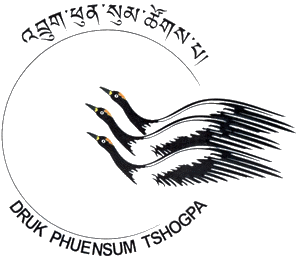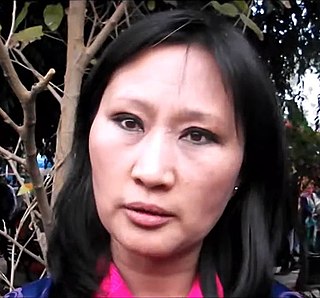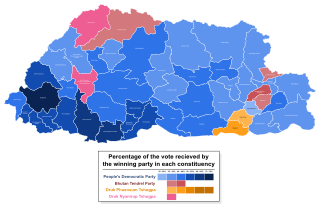
LyonpoKhandu Wangchuk is a political figure in Bhutan. He graduated from St. Stephen's College, University of Delhi. He was Chairman of the council from 2001 until 2002. On 7 September 2006, he became Prime Minister again; he was then replaced by Kinzang Dorji on 2 August 2007, after Wangchuk resigned to participate in the 2008 election as a member of the Druk Phuensum Tshogpa (DPT) political party. He also served as Minister of Foreign Affairs from 2003 to 2007.
The development of Bhutanese democracy has been marked by the active encouragement and participation of reigning Bhutanese monarchs since the 1950s, beginning with legal reforms such as the abolition of slavery, and culminating in the enactment of Bhutan's Constitution. The first democratic elections in Bhutan began in 2007, and all levels of government had been democratically elected by 2011. These elections included Bhutan's first ever partisan National Assembly election. Democratization in Bhutan has been marred somewhat by the intervening large-scale expulsion and flight of Bhutanese refugees during the 1990s; the subject remains somewhat taboo in Bhutanese politics.

Druk Phuensum Tshogpa is one of the major political parties in Bhutan. It was formed on 25 July 2007 as a merger of the All People's Party and the Bhutan People's United Party, which were both short-lived. The working committee of the merged entity, headed by the former home minister, Jigmi Yoezer Thinley, decided on the name for the new party. On 15 August 2007, Jigmi Yoezer Thinley was elected president of the party, and the party applied for registration, thus becoming the second political party in Bhutan to do so. On 2 October 2007, the Election Commission of Bhutan registered the party. On 24 March 2008, the party won the first general election held in Bhutan. The party secured 45 of the 47 seats to the National Assembly. The party tends to be more popular in the east of the country.
Panbang is a settlement in the south of Bhutan. It is located in Zhemgang District, close to the border with India.

The Bhutanese local government elections of 2011 were originally slated for 2008, but were delayed until 2011. Elections began on January 20, 2011, however polls opened in only 3 of 20 districts – Thimphu, Chukha District (Phuentsholing), and Samdrup Jongkhar – as part of a staggered election schedule. Polls closed June 27, 2011. Ahead of elections, 1,042 chiwogs, the basis of Bhutan's single-constituency electoral scheme, were slated to elect the leadership of Dzongkhag, Gewog, and Thromde governments.
The Bhutan People's Unity Party, also called Druk People's Unity Party (PUP), is a former Bhutanese political party. It was founded by regional and national cadres serving in Bhutan's pre-democratic government. Led by former minister (assemblyman) Yeshey Zimba, BPUP then merged with the stronger All People's Party (APP), headed by former and future prime minister Jigme Y. Thinley; the two parties unified as the Druk Phuensum Tshogpa on 25 July 2007. Both the BPUP and APP had been registered with the Election Commission.

National Assembly elections were held in Bhutan on 31 May and 13 July 2013. The result was a victory for the opposition People's Democratic Party (PDP), which won 32 of the 47 seats. The elections were the second general elections to occur in Bhutan since former King Jigme Singye Wangchuck ushered in democratic reforms.

Druk Nyamrup Tshogpa, formerly the Social Democratic Party, is one of the five registered political parties in Bhutan. It was registered on 20 January 2013. The DNT has been Bhutan's governing party since the 2018 National Assembly election, in which the party won a majority of the seats.

The Druk Chirwang Tshogpa was a Bhutanese political party. It was registered on January 7, 2013. In the primary round of the 2nd National Assembly elections held in 2013, the DCT had 12,457 votes and came fourth place, not winning in any constituency, and so could not take part in the final round. The Election Commission of Bhutan announced on February 26, 2018 that the Party was being deregistered on its own request. The party then merged with Druk Phuensum Tshogpa.
AumDorji Choden is a Bhutanese politician. She was appointed minister of Bhutan's Works and Human Settlement Ministry in 2013, making her the first woman to serve as a minister in Bhutanese cabinet.
Dorji Wangdi is a Bhutanese politician who has been the leader of the Bhutan Peace and Prosperity Party since 2020, and a member of the National Assembly of Bhutan, since 2008. He is currently the Opposition Leader of Bhutan after the resignation of Pema Gyamtsho from active politics.

Lily Wangchuk or Lily Wangchhuk is a Bhutanese politician, diplomat and activist. A diplomat between 1994 and 2008, in November 2012 she became the first Bhutanese woman to be appointed president of a political party.
Wangchuk Namgyel is a Bhutanese educationist and politician who is the current speaker of the National Assembly of Bhutan, in office since November 2018. He has been a member of the National Assembly of Bhutan, since October 2018.
Dorji Tshering is a Bhutanese politician who has been Minister for Works and Human Settlement since November 2018. He has been a member of the National Assembly of Bhutan, since October 2018.
Ugen Tenzin is a Bhutanese politician who has been a member of the National Assembly of Bhutan, since October 2018. Previously, he was a member of the National Assembly of Bhutan from 2008 to 2013.
Dorjee Wangmo is a Bhutanese politician who has been a member of the National Assembly of Bhutan, since October 2018.
Kinga Penjor is a Bhutanese politician who has been a member of the National Assembly of Bhutan, since October 2018.
Karma Lhamo is a Bhutanese educator and politician. She was elected to the National Assembly in 2008, becoming one of its first female members elected under universal suffrage.

National Assembly elections are being held in Bhutan on 30 November 2023 and 9 January 2024.













